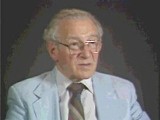<< Previous | Displaying results 2011-2020 of 6719 for "" | Next >>
-
Rachel Mutterperl Goldfarb describes partisan attacks on Germans
Oral HistoryThe Germans established a ghetto in Dokszyce in late 1941. Rachel hid during the liquidation of the ghetto in 1942, and she and her mother escaped to another ghetto. When the second ghetto was about to be liquidated, they escaped again. Rachel and her mother joined a band of partisans in the forest. She helped her mother to cook, and also cleaned weapons. Rachel and her mother tried to leave Europe when the war ended. They eventually arrived in the United States, in 1947.
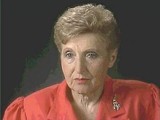
-
Rachel Mutterperl Goldfarb describes how partisans obtained weapons from German soldiers
Oral HistoryThe Germans established a ghetto in Dokszyce in late 1941. Rachel hid during the liquidation of the ghetto in 1942, and she and her mother escaped to another ghetto. When the second ghetto was about to be liquidated, they escaped again. Rachel and her mother joined a band of partisans in the forest. She helped her mother to cook, and also cleaned weapons. Rachel and her mother tried to leave Europe when the war ended. They eventually arrived in the United States, in 1947.
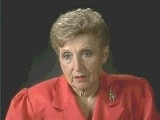
-
Frank Bleichman describes conditions in and dangers facing a partisan camp in the forests of Poland
Oral HistoryFrank was one of seven children born to a religious Jewish family in Kamionka, in the Lublin district of Poland. Germany invaded Poland in September 1939. When deportations of Jews from the Lublin area began in 1942, Frank joined a group of Jewish partisans who roamed the forests in search of weapons and food. After obtaining weapons by posing as Soviet paratroopers, they were able to defend themselves against German raids and take revenge against collaborators. They gradually made connections with Polish…
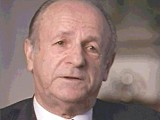
-
Frank Bleichman describes a German raid, with assistance from individual Poles, on a group of Jewish partisans
Oral HistoryFrank was one of seven children born to a religious Jewish family in Kamionka, in the Lublin district of Poland. Germany invaded Poland in September 1939. When deportations of Jews from the Lublin area began in 1942, Frank joined a group of Jewish partisans who roamed the forests in search of weapons and food. After obtaining weapons by posing as Soviet paratroopers, they were able to defend themselves against German raids and take revenge against collaborators. They gradually made connections with Polish…
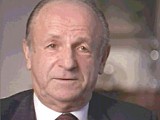
-
Abraham Lewent describes food shortages after the invasion of Warsaw
Oral HistoryLike other Jews, the Lewents were confined to the Warsaw ghetto. In 1942, as Abraham hid in a crawl space, the Germans seized his mother and sisters in a raid. They perished. He was deployed for forced labor nearby, but escaped to return to his father in the ghetto. In 1943, the two were deported to Majdanek, where Abraham's father died. Abraham later was sent to Skarzysko, Buchenwald, Schlieben, Bisingen, and Dachau. US troops liberated Abraham as the Germans evacuated prisoners.
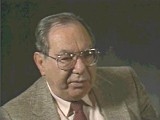
-
Abraham Lewent describes conditions in the Warsaw ghetto
Oral HistoryLike other Jews, the Lewents were confined to the Warsaw ghetto. In 1942, as Abraham hid in a crawl space, the Germans seized his mother and sisters in a raid. They perished. He was deployed for forced labor nearby, but escaped to return to his father in the ghetto. In 1943, the two were deported to Majdanek, where Abraham's father died. Abraham later was sent to Skarzysko, Buchenwald, Schlieben, Bisingen, and Dachau. US troops liberated Abraham as the Germans evacuated prisoners.
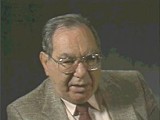
-
Abraham Lewent describes hiding during a raid in which his mother and sisters were seized for deportation from Warsaw to Treblinka
Oral HistoryLike other Jews, the Lewents were confined to the Warsaw ghetto. In 1942, as Abraham hid in a crawl space, the Germans seized his mother and sisters in a raid. They perished. He was deployed for forced labor nearby, but escaped to return to his father in the ghetto. In 1943, the two were deported to Majdanek, where Abraham's father died. Abraham later was sent to Skarzysko, Buchenwald, Schlieben, Bisingen, and Dachau. US troops liberated Abraham as the Germans evacuated prisoners.
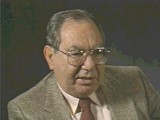
-
Abraham Lewent describes conditions in Skarzysko camp
Oral HistoryLike other Jews, the Lewents were confined to the Warsaw ghetto. In 1942, as Abraham hid in a crawl space, the Germans seized his mother and sisters in a raid. They perished. He was deployed for forced labor nearby, but escaped to return to his father in the ghetto. In 1943, the two were deported to Majdanek, where Abraham's father died. Abraham later was sent to Skarzysko, Buchenwald, Schlieben, Bisingen, and Dachau. US troops liberated Abraham as the Germans evacuated prisoners.
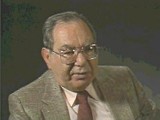
-
Abraham Lewent recalls how, while ill with typhoid, he persuaded the Skarzysko doctor that he was fit to work
Oral HistoryLike other Jews, the Lewents were confined to the Warsaw ghetto. In 1942, as Abraham hid in a crawl space, the Germans seized his mother and sisters in a raid. They perished. He was deployed for forced labor nearby, but escaped to return to his father in the ghetto. In 1943, the two were deported to Majdanek, where Abraham's father died. Abraham later was sent to Skarzysko, Buchenwald, Schlieben, Bisingen, and Dachau. US troops liberated Abraham as the Germans evacuated prisoners.
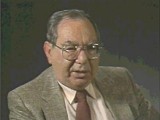
-
Chaim Engel describes arrival in Sobibor
Oral HistoryIn 1939, as Chaim's tour in the Polish army was nearing its scheduled end, Germany invaded Poland. The Germans captured Chaim and sent him to Germany for forced labor. As a Jewish prisoner of war, Chaim later was returned to Poland. Ultimately, he was deported to the Sobibor camp, where the rest of his family died. In the 1943 Sobibor uprising, Chaim killed a guard. He escaped with his girlfriend, Selma, whom he later married. A farmer hid them until liberation by Soviet forces in June 1944.
